Saturday, March 30, 2013
Holy Saturday 2013






Station Church:
Saint John Lateran
From The Passion And Death Of Jesus Christ, by Saint Alphonsus de Liguori:
O my Jesus, O infinitely lovely ! grant that I may no longer live ungrateful to so great a good ! For the past I have lived in forgetfulness of Thy love, and of all Thou hast suffered for me; but henceforth I would think of nothing but loving Thee. O wounds of Jesus, stricken with love ! O blood of Jesus, inebriated with love ! O death of Jesus! cause me to die to every love which is not love for him. O Jesus ! I love Thee above everything. I love Thee with all my soul; I love Thee more than myself. I love Thee, and because I love Thee, I would die of grief because I have so often turned my back upon Thee, and have despised Thy grace. By Thy merits, O my crucified Saviour, give me Thy love, and make me all Thine own.
O Mary, my hope ! make me love Jesus Christ, and I ask nothing more.
Devotions For A Lenten Saturday Holy Hour
Divine Mercy Chaplet
Seven Penitential Psalms
Prayer of St. Thomas More
Threnus Prayer of Saint Augustine
Stabat Mater Dolorosa
Litany of Our Lady of Sorrows
Sorrowful Mysteries
Holy Saturday, A Sermon by Monsignor Ronald Knox
"He went and preached to the spirits who lay in prison." 1 Peter 3:19
After the Mass of Holy Saturday, when you are sitting in your room, perhaps with some favorite book in front of you, there is a sudden knock at the door. "Come in", you shout cheerily, half turning to greet the visitor. The door is opened by a priest in cotta and stole, who, after a brief Latin salutation, sprinkles the treasured volume liberally with holy water, and withdraws. What sacred thoughts ought to be ours on this occasion?
For myself, I like to think of some old patriarch in Limbo, King David, let us say, waiting, through long centuries of twilight for his permit to enter heaven. Waiting, not under the stroke of divine chastisement, but with a patience beyond all our imagining; alone there, with his memories and his hopes, like a watchman waiting for the dawn. The Spirit of Christ is in him, making known to him the sufferings which Christ's cause brings with it, and the glory that crowns them; when is it to be? And how is the time of it to be recognized? All at once, the door of his prison springs open, and in a blaze of light he sees the figure so often, in his poetic imaginings, ah, how dimly foreshadowed, the martyred Christ, wounds shining on hands and feet! Christ is risen, and David, waking up after his likeness, finds there everlasting content.
Does prudence, does piety demand of us that we should think of our Lord's Passion as having availed a few, only a very few, of the men who died before him? That was not what medieval writers meant when they talked of the harrowing of Hell. They meant that a vast army of souls, we cannot tell how multitudinous, escaped in that hour from the grip in which the Devil seemed to hold them. And indeed, in the very passage from which I quoted, St. Peter gives a curious description of these souls to whom our Lord preached the message of his Resurrection. "Long before, they had refused belief...in the days of Noe (Noah)." It was not merely, as you might have expected, Noe and Sem and Cham and Japhet, with their wives, survivors of a drowned world, that rose to acclaim the risen Christ. No, even in the days of general corruption before the deluge, there were souls, strange to think of it, that belonged to Him. Their mortal natures paid the penalty in men's eyes, but in the sight of God their spirits were to live on. And so it was, doubtless, with all the great catastrophes that overtook mankind before the coming of our redemption. Always a proportion of the victims, by some merciful dispensation whose nature we cannot guess, had escaped Hell, had achieved the title to an immortal destiny. They only waited for Easter Day when, in their prison, the imprisoned Christ would come to them, and they would refuse belief no longer.
You and I, maybe, after death, will find ourselves in the twilight state known as Purgatory. Saved (please God) by faith in the risen Christ, we shall not yet be partakers in the glory of His Resurrection. Preachers who discuss the conditions of that intermediate state are apt to lay stress on the severity of the divine punishments. They may be right; it is a fearful thing to fall into the hands of the living God. Only, I dare to hope that the severity of it will be relieved by something we had no right to expect, something we had never been told about, the influence of our blessed Lord's passing, on Easter Eve, through the place of the departed spirits. The holy water still glistens on your table when the priest has come and gone; what if our Lord, on that first Holy Saturday, blessed it once for all with a lustration which time can never efface? I like to think of Purgatory, however long and however dreary it be, as consoled in some measure by the consciousness that He has been there before us; as a process of passing onwards from room to room, always with the sense that the presence of one we love has only just been withdrawn. Not strong enough, yet, to follow Him out into the sunlight, we shall follow Him eagerly through the dark. Is that fanciful?
At least let me say this; I think we do well, at Easter-tide, to remember our dead. No do not exclaim that I am a kill-joy, clouding your festival with sad thoughts.(GTF: my emphasis) True, it is life, not death that is uppermost in our thoughts; the spring air, the crisp, clean associations of the Easter liturgy, heal the mind with hopes of renewal. But consider, when you see our Lord represented as rising from the tomb with a banner in His hand, it is the symbol of a military penetration; He, the Victor, in rolling back the stone has made a breach in the enemy's lines, for what? So that the army of His redeemed may pour through at His heels. Or, if you will use St. Paul's metaphor, his is the first birth out of death; He has opened the barren womb of extinction, not for Himself only but so as to be the first-born of many brethren. Vidi aquam--our Lord's Resurrection is the opening of the springs; the full river has yet to flow. It broadens out, reaches its fulfillment, in ours.
To be sure, our bodies must await the day of judgment, buried in their native earth; only Himself and His Blessed Mother escape altogether from the primal curse. But Heaven, from hour to hour, is being peopled with spirits of just men made perfect, like the hedgerows yonder, that are silently bursting into bud. And shall we give no thought to those other spirits that are sill in prison, thwarted growths, the Gardener bestowed such pains on? Now, when the very air seems charged with paschal grace, it is but common charity that we should want to share it with them; now, while the spring grass is fresh over their graves, it is but seasonable that the memory of them should be renewed. More souls, this Easter morning, looking up to see the stone rolled away from their dungeon door, and a risen Master standing there in the daylight to welcome them: "Rise up, rise up quickly, and come with me! The winter is over now, the rain has passed by."
And can we, in these times, mention the very word "prison" without being reminded of other souls, still in the flesh, tens of thousands of them, held ina captivity which makes Purgatory seem like a welcome thought? Christian souls--have they still the means to reckon the calendar of Christendom? If so, you may picture them exchanging today, half ironically, the familiar greeting, "Christ is risen." Pro afflictis et captivis --how full of meaning these words sound in wartime, how lightly they cross our lips when our tiny corner of the world is at peace! Let us pray for them, too, bishops and priests and layfolk, forgotten heroes of Christendom; victims of that faith which you and I wear on our sleeves...Then, with slower step, but with undiminished courage, let us go back to keep the feast of our redemption.
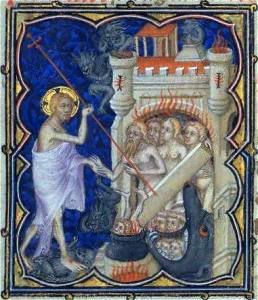
********************************************************************************
I assume your serious Lenten preparation, your program of spiritual reading, including visual lectio (watching movies like The Passion of the Christ, or Jesus of Nazareth, or Ben Hur), your examination of conscience and confession, are done now, and that you are now in a state of grace preparatory to meeting your Easter obligation either tonight at the Easter Vigil, or tomorrow morning.
Good. Now the fun begins.
First, for general principles on how to order and decorate the household for Easter, read my ancient article (so old it has more grey hairs than I have) Straight Eye For the Easter Guy.
Then, Easter is a great feast, and one that comes after an extended period of deprivation from meat and other goodies. So, you need to do some menu planning. Here are some of my ideas.
Friday, March 29, 2013
Friday At the Foot Of the Cross, Lent 7

Ant.
Remember not, O Lord, my offenses, nor the offenses of my fathers, nor takest Thou vengeance upon them.
Psalm 142/143
1 HEAR, O LORD, MY PRAYER, give ear to my supplication in Thy truth: * hear me in Thy justice.
2 And enter not into judgment with Thy servant: * for no one living shall be justified in Thy sight.
3 For the enemy hath persecuted my soul: * he hath ground my life into the earth.
He hath made me dwell in darkness as the dead of old. * 4 And my spirit is in anguish within me: my heart within me is troubled.
5 I remembered the days of old, I meditated on all Thy works: * upon the works of Thy hands I pondered.
6 I stretched forth my hands to Thee: * my soul is as earth without water unto Thee.
7 Hear me speedily, O Lord: * my spirit hath fainted away. Turn not away Thy face from me, * lest I be like those that go down into the pit.
8 Cause me to hear Thy mercy in the morning; * for in Thee have I hoped.
Make the way known to me, wherein I should walk: * for I have lifted up my soul to Thee.
9 Deliver me from my enemies, O Lord, to Thee have I fled. * 10 Teach me to do Thy will, * for Thou art my God.
Thy good spirit shall lead me into the right land: * 11 for Thy name's sake, O Lord, Thou wilt give me life in Thy justice.
Thou shalt bring my soul out of trouble. * 12 And in Thy mercy Thou wilt destroy my enemies.
And Thou wilt cut off all that afflict my soul: * for I am Thy servant.
GLORY be to the Father, and to the Son, and to the Holy Ghost. As it was in the beginning, is now, and will be forever. Amen.
Prayer Against Sloth
O my God, did I ever begin to love Thee and to praise Thee with all my heart, with all my soul and with all my strength, in some part equal to Thee, who in Thy perpetual charity chose me and committed me to Thee forever? Alas, my soul has slept out of tedium! Woe to me, for so far until now in Thy service I have been tepid, so that I might be able to fear rightly, do not begin to vomit me from Thy mouth. (Rev 3:16) But spare me, O Lord, do not enter into judgment with Thy servant for none of the living are justified in Thy sight. I stretch out my hands to Thee, my soul is as earth without water unto Thee. Hear me speedily, O Lord, my spirit hath fainted away. Thy good spirit shall lead me into the right land. For Thy name's sake, O Lord, Thou wilt give me life. (Ps. 142:11)
Pater. Ave.
Ant.
Remember not, Lord, my offenses, nor the offenses of my fathers, nor takest Thou vengeance upon them.
Good Friday, 2013










Station Church:
S. Croce in Gerusalemme
Devotions for Good Friday:
Participate in Veneration of the Cross,
Stations of the Cross,
And begin the Divine Mercy Novena at the Hour of Mercy, 3pm
The Good Friday Prayer:
"O, my Lord Jesus, I hereby beg of Thee, by the merits of Thy Precious Blood, by Thy Divine Heart, and by the intercession of Thy Most Holy Death to assist me in this pressing necessity."
(To be said 33 times for each intention. It must be said between the hours of 12 noon and 3 PM on Good Friday)
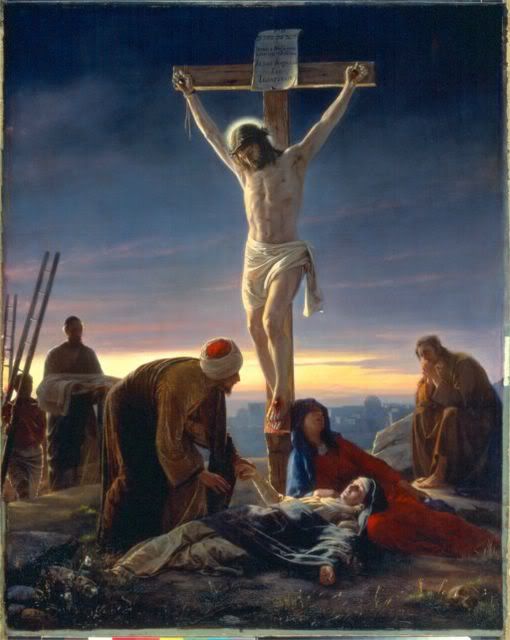
From The Passion and Death Of Jesus Christ, by Saint Alphonsus de Liguori:
O my dear Redeemer, well do I recognise in these Thy Wounds, and in Thy lacerated Body, as it were through so many lattices the tender affection which Thou dost retain for me. Since, then, in order to pardon me, Thou hast not pardoned Thyself, oh, look upon me now with the same love wherewith Thou didst one day look upon me from the Cross, whilst Thou wert dying for me. Look upon me and enlighten me, and draw my whole heart to Thyself, so that, from this day forth, I may love none else but Thee. Let me not ever be unmindful of Thy Death. Thou didst promise that, when raised up upon the Cross, Thou wouldst draw all our hearts to Thee. Behold this heart of mine, which, made tender by Thy Death and enamoured of Thee, desires to offer no further resistance to Thy calls. Oh, do Thou draw it to Thyself, and make it all Thine own.
Thou hast died for me, and I desire to die for Thee; and if I continue to live, I will live for Thee alone. O Pains of Jesus, O Ignominies of Jesus, O Death of Jesus, O Love of Jesus, fix yourselves within my heart, and let the remembrance of you abide there always, to be continually smiting me, and inflaming me with love. I love Thee, O Infinite Goodness; I love Thee, O Infinite Love. Thou art and shalt ever be, my one and only Love. O Mary, Mother of love, do thou obtain me love.
The Via Crucis, or Way Of the Cross, According To the Method of Saint Alphonsus Liguori
In past years, I have used recognized "great" art in the pre-modern Western tradition to illustrate these Stations of the Cross. This year, I want to do something different. In my personal exercise of the Stations, I use the TAN booklet, which features illustrations from the 1913 Benzinger Brothers edition. I find the illustrations quite packed with action, with so many things going on in each Station's illustration, and therefore very good. They also have the advantage of providing a unified vision of the Passion, as can only come from one artist. The downside is tha they are available only in the small-size format seen here, and are in black and white only.
I have also modified the Stations, by providing a uniform prayer conclusion to the People's meditation. St. Alphonsus' text shows minor variation in this from Station to Station, so little variation that it is clear that he just wasn't concentrating on uniformity, but intended each to end more or less the same way.
Like the TAN edition I use, I have imported from the Franciscan method the versicle and response "Lord Jesus crucified/Have mercy on us," after the Pater, Ave and Doxologia Minor of each station.
Without further ado, I turn you over to St. Alphonsus.
Let each one, kneeling before the high altar, make an Act of Contrition, and form the intention of gaining the indulgences connected to this devotion, whether for himself, or for the souls in Purgatory. Then say:
Preparatory Prayer
My Lord Jesus Christ, Thou hast made this journey to die for me with love unutterable, and I have so many times unworthily abandoned Thee; but now I love Thee with my whole heart, and because I love Thee I repent sincerely for having ever offended Thee. Pardon me, my God, and permit me to accompany Thee on this journey. Thou goest to die for love of me; I wish also, my beloved Redeemer, to die for love of Thee. My Jesus, I will live and die always united to Thee.
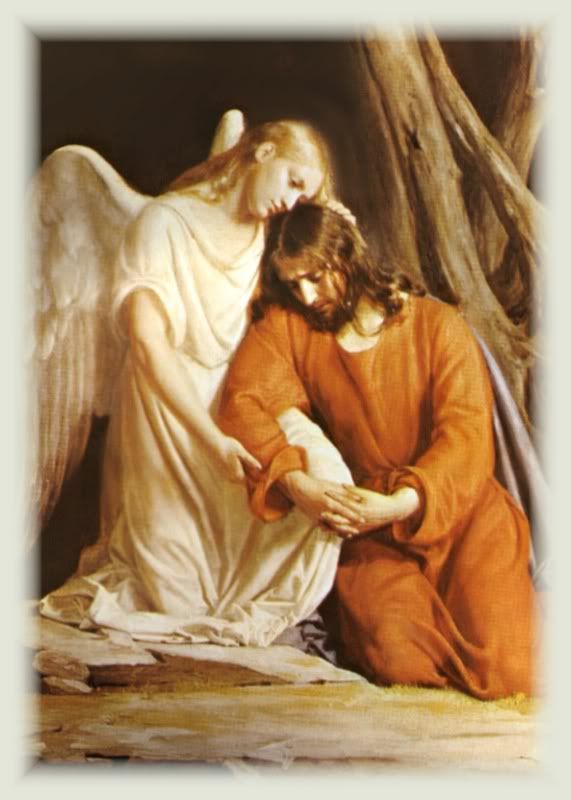
From The Enchiridion of Indulgences:
63. EXERCISE OF THE WAY OF THE CROSS. PLENARY INDULGENCE.
A Plenary indulgence is granted to those who piously make the Way of the Cross. The gaining of the indulgence is regulated by the following rules:1. Must be done before stations of the cross legitimately erected.
2. 14 stations are required. Although it is customary for the icons to represent pictures or images, 14 simple crosses will suffice.
3. The common practice consists of fourteen pious readings to which some vocal prayers are added.. However, nothing more is required than a pious meditation on the Passion and Death of the Lord, which need not be a particular consideration of the individual mysteries of the stations.
4. A movement from one station to the next is required. But if the stations are made publicly and it is not possible for everyone taking part to go from station to station, it suffices if at least the one conducting the exercise goes from station to station, the others remaining in their places.
5. Those who are "impeded" can gain the same indulgence if they spend at least one half and hour in pious reading and meditation on the Passion and Death of our Lord Jesus Christ.
6. For those belonging to the Oriental rites, amongst whom this pious exercise is not practiced, the respective Patriarchs can determine some other pious exercise in memory of the Passion and Death for the gaining of this indulgence.
GTF NOTE:
Praying an on-line version (or one from a pamphlet on your own at home) probably only gains a partial indulgence, as there is no physical movement between properly marked stations. But perhaps an expert has more insight, after all, if you are "impeded" you get the plenary indulgence for just a half hour's thought on Our Lord's Passion.
The First Station
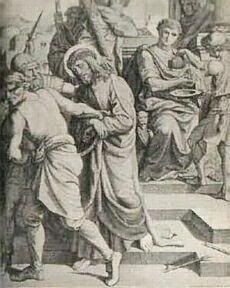
Jesus is Condemned to Death
V. We adore Thee, O Christ, and we praise Thee.
R. Because by Thy holy Cross Thou hast redeemed the world.
V. Adoramus te, Christe, et benedicimus tibi.
R. Quia per sanctam crucem tuam redemisti mundum.
Consider how Jesus, after having been scourged and crowned with thorns, was unjustly condemned by Pilate to die on the Cross.
Considera quomodo Iesus Christus, iam flagellatus et spinis coronatus, iniuste tandem a Pilato ad mortem crucis condemnetur.
My adorable Jesus, it was not Pilate; no, it was my sins that condemned Thee to die. I beseech Thee, by the merits of this sorrowful journey to assist my soul in its journey toward eternity.
I love Thee, my beloved Jesus, more than myself; I repent with all heart of ever having offended Thee. Never permit me to offend Thee again. Grant that I may love Thee always, and then do with me what Thou wilt.
O adorande Iesu, non Pilatus, sed iniqua mea vita te ad mortem condemnavit. Per meritum laboriosissimi huius itineris, quod ad Calvariae montem instituis, precor te, ut me semper in via, qua anima mea in aeternitatem tendit, benigne comiteris. Amo te, o Iesu, mi Amor, magis quam meipsum, et ex intimo corde paenitet me quod tibi displicui. Ne sinas me iterum a te separari. Da mihi perpetuum amorem tui, et dein fac de me quidquid tibi placuerit. Quod tibi placitum est, hoc idem mihi est acceptum.
Pater, Ave, Doxologia Minor
At the cross her station keeping,
Stood the mournful Mother weeping,
Close to Jesus to the last.
Stabat Mater dolorosa
Juxta Crucem lacrimosa,
Dum pendebat Filius.
V. Lord Jesus, crucified,
R. Have mercy on us!
The Second Station
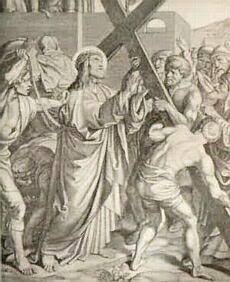
Jesus Takes Up His Cross
V. We adore Thee, O Christ, and we praise Thee.
R. Because by Thy holy Cross Thou hast redeemed the world.
V. Adoramus te, Christe, et benedicimus tibi.
R. Quia per sanctam crucem tuam redemisti mundum.
Consider how Jesus, in making this journey with the Cross on His shoulders, thought of us, and offered for us to His Father the death He was about to undergo.
Considera quomodo Iesus Christus, portans humeris crucem, fuerit inter eundum, memor tui, offerendo pro te aeterno Patri mortem, quam erat obiturus.
My most beloved Jesus, I embrace all the tribulations Thou hast destined for me until death. I beseech Thee, by the merits of the pain Thou did suffer in carrying Thy Cross, to give me the necessary help to carry mine with perfect patience and resignation.
I love Thee, Jesus my love; more than I love myself; I repent with my whole heart of ever having offended Thee. Never permit me to offend Thee again. Grant that I may love Thee always, and then do with me what Thou wilt.
Amabilissime Iesu, amplector omnes res adversas, quas mihi usque ad obitum tolerandas praefixisti, et, per durum illum, quem in portanda tua cruce pertulisti, laborem, precor te, ut vires mihi subministres, quibus ego quoque crucem meam, aequo ac patienti animo, portare valeam. Amo te, o Iesu, mi Amor, paenitet me quod tibi displicui. Ne sinas me iterum separari a te. Da mihi perpetuum amorem tui, et dein fac de me quidquid tibi placuerit.
Pater, Ave, Doxologia Minor
Through her heart, His sorrow sharing,
All His bitter anguish bearing,
Now at length the sword had pass'd.
Cujus animam gementem,
Contristatam et dolentem,
Pertransivit gladius.
V. Lord Jesus, crucified,
R. Have mercy on us!
The Third Station
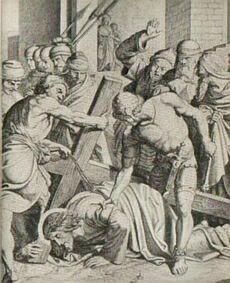
Jesus Falls the First Time
V. We adore Thee, O Christ, and we praise Thee.
R. Because by Thy holy Cross Thou hast redeemed the world.
V. Adoramus te, Christe, et benedicimus tibi.
R. Quia per sanctam crucem tuam redemisti mundum.
Consider this first fall of Jesus under His Cross. His flesh was torn by the scourges, His head crowned with thorns, and He had lost a great quantity of blood. He was so weakened that He could scarcely walk, and yet He had to carry this great load upon His shoulders. The soldiers struck Him rudely, and thus He fell several times in His journey.
Considera primum hunc Iesu Christi sub cruce lapsum. Habebat carnem ex saeva flagellatione multifarie sauciam, caput redimitum spinarum corona: profuderat insuper cruorem in tanta copia, ut vix pedem prae virium defectione, movere posset. Et quoniam gravi crucis onere premebatur, et immisericorditer a militibus propellebatur, accidit ut pluries inter eundum humi procumberet.
My beloved Jesus, it is not the weight of the Cross, but my sins which hast made Thee suffer so much pain. By the merits of this first fall, deliver me from the misfortune of falling into mortal sin.
I love Thee, my beloved Jesus, more than myself; I repent with all heart of ever having offended Thee. Never permit me to offend Thee again. Grant that I may love Thee always, and then do with me what Thou wilt.
O mi Iesu, non est onus crucis, sed peccatorum meorum pondus, quod tantis te afficit doloribus. Rogo te, per primum hunc tuum lapsum, ut ab omni in peccatum me lapsu tuearis. Amo te, o Iesu, ex toto corde meo; paenitet me quod tibi displicui. Ne sinas me iterum in peccatum prolabi. Da mihi perpetuum amorem tui, et dein fac de me quidquid tibi placuerit.
Pater, Ave, Doxologia Minor
Oh, how sad and sore distress'd
Was that Mother highly blest
Of the sole-begotten One !
O quam tristis et afflicta
Fuit illa benedicta
Mater Unigeniti!
V. Lord Jesus, crucified,
R. Have mercy on us!
The Fourth Station
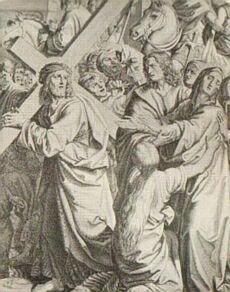
Jesus Meets His Afflicted Mother
V. We adore Thee, O Christ, and we praise Thee.
R. Because by Thy holy Cross Thou hast redeemed the world.
V. Adoramus te, Christe, et benedicimus tibi.
R. Quia per sanctam crucem tuam redemisti mundum.
Consider the meeting of the Son and the Mother, which took place on this journey. Jesus and Mary looked at each other, and their looks became as so many arrows to wound those hearts which loved each other so tenderly.
Considera qualis fuerit, in hac via, Filii et Matris occursus. Iesus et Maria se mutuo aspexerunt, mutuique eorum aspectus, fuerunt totidem sagittae, quibus amantia eorum pectora transverberabantur.
My most loving Jesus, by the sorrow that Thou didst experience in this meeting, grant me the grace of a truly devoted love for Thy most holy Mother. And thou, my Queen, who was overwhelmed with sorrow, obtain for me, by thy intercession, a continual and tender remembrance of the Passion of thy Son.
I love Thee, my beloved Jesus, more than myself; I repent with all heart of ever having offended Thee. Never permit me to offend Thee again. Grant that I may love Thee always, and then do with me what Thou wilt.
Amantissime Iesu, per acerbum dolorem, quem in hoc occursu expertus es, redde me, precor, sanctissimae Matri tuae vere devotum. Tu vero, perdolens mea Regina, intercede pro me, et obtine mihi talem cruciatum Filii tui memoriam, ut mens mea in pia illorum contemplatione perpetuo detineatur. Amo te, o Iesu, mi Amor; paenitet me quod tibi displicui. Ne sinas me iterum in te peccare. Da mihi perpetuum amorem tui, et dein fac de me quidquid tibi placuerit.
Pater, Ave, Doxologia Minor
Christ above in torment hangs;
She beneath beholds the pangs
Of her dying glorious Son.
Quem maerebat, et dolebat,
Pia Mater, dum videbat
Nati paenas inclyti.
V. Lord Jesus, crucified,
R. Have mercy on us!
The Fifth Station
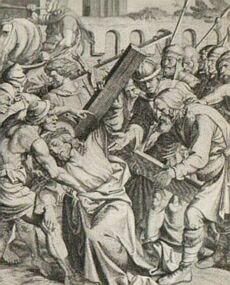
Jesus Is Aided By Simon of Cyrene
V. We adore Thee, O Christ, and we praise Thee.
R. Because by Thy holy Cross Thou hast redeemed the world.
V. Adoramus te, Christe, et benedicimus tibi.
R. Quia per sanctam crucem tuam redemisti mundum.
Consider how the Jews, seeing that at each step, Jesus, from weakness, was on the point of expiring, and fearing that He would die on the way, when they wished Him to die the shameful death of the Cross, constrained Simon the Cyrenian to carry the Cross behind our Lord.
Considera quomodo Iudaei, videntes Iesum ad quemlibet passum animam propemodum prae lassitudine efflantem, et timentes ex altera parte ne, quem crucis supplicio affectum volebant, in via moreretur, compellant Simonem Cyrenaeum ad baiulandam crucem post Dominum.
My most beloved Jesus, I will not refuse the Cross as the Cyrenian did; I accept it -I embrace it. I accept in particular the death Thou hast destined for me, with all the pains which may accompany it; I unite it to Thy death - I offer it to Thee. Thou hast died for love of me. I will die for love of Thee, and to please Thee. Help me by Thy grace.
I love Thee, my beloved Jesus, more than myself; I repent with all heart of ever having offended Thee. Never permit me to offend Thee again. Grant that I may love Thee always, and then do with me what Thou wilt.
O dulcissime Iesu, nolo sicut Cyrenaeus, repudiare crucem, libenter eam amplector in meque recipio, amplector speciatim quam mihi praefiniisti mortem cum omnibus, quos haec secum adductura est, doloribus. Coniungo eam cum morte tua, sicque coniunctam eam in sacrificium tibi offero. Tu amore mei mortuus es; volo ego quoque mori amore tui, ea mente ut rem tibi gratam faciam. Tu vero adiuva me tua gratia. Amo te, o Iesu, mi Amor, paenitet me quod tibi displicui. Ne sinas me iterum tibi displicere. Da mihi perpetuum amorem tui, et dein fac de me quidquid tibi placuerit.
Pater, Ave, Doxologia Minor
Is there one who would not weep,
Whelm'd in miseries so deep
Christ's dear Mother to behold?
Quis est homo, qui non fleret,
Matrem Christi si videret I
n tanto supplicio?
V. Lord Jesus, crucified,
R. Have mercy on us!
The Sixth Station
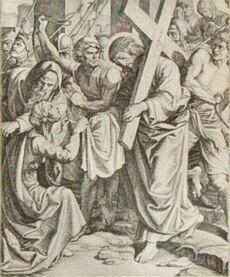
Jesus' Face Is Wiped By Veronica
V. We adore Thee, O Christ, and we praise Thee.
R. Because by Thy holy Cross Thou hast redeemed the world.
V. Adoramus te, Christe, et benedicimus tibi.
R. Quia per sanctam crucem tuam redemisti mundum.
Consider how the holy woman named Veronica, seeing Jesus so afflicted, and His face bathed in sweat and blood, presented Him with a towel, with which He wiped His adorable face, leaving on it the impression of His holy countenance.
Considera quomodo sancta illa femina Veronica, videns Iesum doloribus confectum eiusque vultum sudore ac sanguine madidum, porrigat ei linteolum in quo ipse, abstersa facie, sacram sui imaginem impressam relinquit.
My most beloved Jesus, Thy face was beautiful before, but in this journey it hast lost all its beauty, and wounds and blood have disfigured it. Alas! my soul also was once beautiful, when it received Thy grace in Baptism; but I have disfigured it since by my sins. Thou alone, my Redeemer, can restore it to its former beauty. Do this by Thy Passion.
I love Thee, my beloved Jesus, more than myself; I repent with all heart of ever having offended Thee. Never permit me to offend Thee again. Grant that I may love Thee always, and then do with me what Thou wilt.
O mi Iesu, formosa erat antea facies tua; verum hac in via non amplius formosa apparet, sed est vulneribus et cruore omnino deformis. Hei mihi! quam formosa quoque erat anima mea, cum gratiam tuam per baptismum recepisset: peccando eam postea deformem reddidi. Tu solus, mi Redemptor, pristinam venustatem ei restituere vales; quod ut facias, per tuae Passionis meritum te precor. Amo te Iesu, mi Amor; paenitet me quod tibi displicui; ne sinas me iterum tibi displicere. Da mihi perpetuum amorem tui, et dein fac de me quidquid tibi placuerit.
Pater, Ave, Doxologia Minor
Can the human heart refrain
From partaking in her pain,
In that Mother's pain untold?
Quis non posset contristari,
Christi Matrem contemplari
Dolentem cum Filio?
V. Lord Jesus, crucified,
R. Have mercy on us!
The Seventh Station
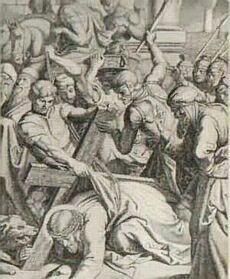
Jesus Falls the Second Time
V. We adore Thee, O Christ, and we praise Thee.
R. Because by Thy Holy Cross Thou hast redeemed the world.
V. Adoramus te, Christe, et benedicimus tibi.
R. Quia per sanctam crucem tuam redemisti mundum.
Consider the second fall of Jesus under the Cross - a fall which renews the pain of all the wounds of the head and members of our afflicted Lord.
Considera alterum Iesu Christi sub cruce lapsum, quo lapsu perdolenti Domino omnes venerandi capitis et totius corporis plagae recrudescunt, omnesque cruciatus renovantur.
My most gentle Jesus, how many times Thou hast pardoned me, and how many times have I fallen again, and begun again to offend Thee! Oh! By the merits of this new fall, give me the necessary helps to persevere in Thy grace until death. Grant that in all temptations which assail me, I may always commend myself to Thee.
I love Thee, my beloved Jesus, more than myself; I repent with all heart of ever having offended Thee. Never permit me to offend Thee again. Grant that I may love Thee always, and then do with me what Thou wilt.
Mansuetissime Iesu, quam frequenter concessisti mihi veniam! Ego vero in eadem relapsus sum peccata, measque in te offensas renovavi. Per meritum novi huius tui lapsus adiuva me, ut in gratia tua usque ad obitum perseverem. Fac ut in omnibus, quae me invasurae sunt, tentationibus me tibi semper commendem. Amo te ex toto corde meo, o Iesu, mi Amor; paenitet me quod tibi displicui: ne sinas me iterum tibi displicere. Da mihi perpetuum amorem tui, et dein fac me quidquid tibi placuerit.
Pater, Ave, Doxologia Minor
Bruis'd, derided, curs'd, defil'd,
She beheld her tender child
All with bloody scourges rent.
Pro peccatis suae gentis
vidit Iesum in tormentis,
et flagellis subditum.
V. Lord Jesus, crucified,
R. Have mercy on us!
The Eighth Station
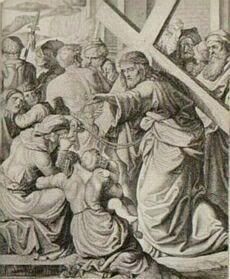
Jesus Consoles the Women of Jersusalem
V. We adore Thee, O Christ, and we praise Thee.
R. Because by Thy holy Cross Thou hast redeemed the world.
V. Adoramus te, Christe, et benedicimus tibi.
R. Quia per sanctam crucem tuam redemisti mundum.
Consider how those women wept with compassion at seeing Jesus in such a pitiable state, streaming with Blood, as He walked along. But Jesus said to them: "Weep not for Me, but for your children."
Considera quomodo mulieres, videntes Iesum lassitudine exanimatum et cruore inter eundum diffluentem, commiseratione permoveantur, lacrimasque profundant. Ad flentes autem conversus: "Nolite, inquit, flere super me, sed super vos ipsas flete et super filios vestros."
My Jesus, laden with sorrows, I weep for the offenses I have committed against Thee, because of the pains they have deserved, and still more because of the displeasure they have caused Thee, Who hast loved me so much. It is Thy love more than the fear of hell, which causes me to weep for my sins.
I love Thee, my beloved Jesus, more than myself; I repent with all heart of ever having offended Thee. Never permit me to offend Thee again. Grant that I may love Thee always, and then do with me what Thou wilt.
O perdolens Iesu, defleo mea in te peccata ob poenas quidem quibus me dignum reddiderunt, sed maxime ob molestiam quam tibi intulerunt, tibi qui me tantopere amasti. Ad fletum minus infernus quam amor tui me excitat. O mi Iesu, amo te magis quam meipsum; paenitet me quod tibi displicui; ne sinas me iterum tibi displicere. Da mihi perpetuum amorem tui, et dein fac de me quidquid tibi placuerit.
Pater, Ave, Doxologia Minor
For the sins of His own nation,
saw Him hang in desolation,
Till His spirit forth He sent.
Vidit suum dulcem Natum
moriendo desolatum,
dum emisit spiritum.
V. Lord Jesus, crucified,
R. Have mercy on us!
The Ninth Station
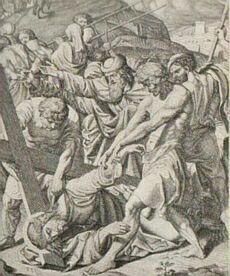
V. We adore Thee, O Christ, and we praise Thee.
R. Because by Thy holy Cross Thou hast redeemed the world.
V. Adoramus te, Christe, et benedicimus tibi.
R. Quia per sanctam crucem tuam redemisti mundum.
Consider the third fall of Jesus Christ. His weakness was extreme, and the cruelty of His executioners excessive, who tried to hasten His steps when he had scarcely strength to move.
Considera tertium Iesu Christi sub cruce lapsum. Procumbit quia nimia erat eius debilitas, et nimia saevitia carnificum, qui volebant ut gressum acceleraret, dum vix unum gradum facere posset.
Oh, my outraged Jesus, by the merits of the weakness Thou didst suffer in going to Calvary, give me strength sufficient to conquer all human respect, and all my wicked passions, which have led me to despise Thy friendship.
I love Thee, my beloved Jesus, more than myself; I repent with all heart of ever having offended Thee. Never permit me to offend Thee again. Grant that I may love Thee always, and then do with me what Thou wilt.
O inclementer habite Iesu, per meritum illius virium defectionis, qua in via ad Calvarium laborare voluisti, tanto, precor, me vigore conforta, ut nullum amplius ad humana iudicia respectum habeam, ac vitiosam meam naturam edomem: quod utrumque in causa fuit cur tuam olim amicitiam contempserim. Amo te, o Iesu, mi Amor, ex toto corde meo; paenitet me quod tibi displicui: ne sinas me iterum tibi displicere. Da mihi perpetuum amorem tui, et dein fac de me quidquid tibi placuerit.
Pater, Ave, Doxologia Minor
O thou Mother! fount of love!
Touch my spirit from above,
Make my heart with thine accord:
Eia, Mater, fons amoris
me sentire vim doloris
fac, ut tecum lugeam.
V. Lord Jesus, crucified,
R. Have mercy on us!
The Tenth Station
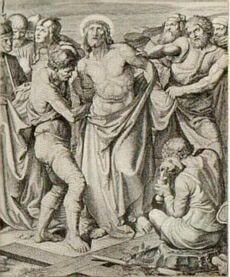
Jesus Is Stripped of His Garments
V. We adore Thee, O Christ, and we praise Thee.
R. Because by Thy holy Cross Thou hast redeemed the world.
V. Adoramus te, Christe, et benedicimus tibi.
R. Quia per sanctam crucem tuam redemisti mundum.
Consider the violence with which the executioners stripped Jesus. His inner garments adhered to His torn flesh, and they dragged them off so roughly that the skin came with them. Compassionate your Savior thus cruelly treated, and say to Him:
Considera quam violenter Iesus vestimentis suis spolietur. Cum enim vestis interior arcte carni flagellis dilaniatae adhaereret, carnifices, avellendo vestem, cutem ei quoque avellunt. Subeat te commiseratio Domini tui, eumque sic alloquere:
My innocent Jesus, by the merits of the torments Thou hast felt, help me to strip myself of all affection to things of earth, in order that I may place all my love in Thee, Who art so worthy of my love.
I love Thee, my beloved Jesus, more than myself; I repent with all heart of ever having offended Thee. Never permit me to offend Thee again. Grant that I may love Thee always, and then do with me what Thou wilt.
Innocentissime Iesu, per meritum doloris quem inter hanc spoliationem passus es, adiuva me, precor, ut omnem in res creatas affectum exuam, et tota voluntatis meae inclinatione ad te solum convertar, qui meo nimis dignus es amore. Amo te ex toto corde meo; paenitet me quod tibi displicui; ne sinas me iterum tibi displicere. Da mihi perpetuum amorem tui, et dein fac de me quidquid tibi placuerit.
Pater, Ave, Doxologia Minor
Make me feel as thou hast felt;
Make my soul to glow and melt
With the love of Christ my Lord.
Fac, ut ardeat cor meum
in amando Christum Deum
ut sibi complaceam.
V. Lord Jesus, crucified,
R. Have mercy on us!
The Eleventh Station
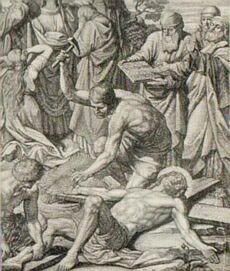
Jesus Is Nailed To the Cross
V. We adore Thee, O Christ, and we praise Thee.
R. Because by Thy holy Cross Thou hast redeemed the world.
V. Adoramus te, Christe, et benedicimus tibi.
R. Quia per sanctam crucem tuam redemisti mundum.
Consider how Jesus, after being thrown on the Cross, extended His hands, and offered to His Eternal Father the sacrifice of His life for our salvation. These barbarians fastened him with nails, and then, raising the Cross, leave Him to die with anguish on this infamous gibbet.
Considera quomodo Iesus in crucem coniciatur, et extensis brachiis, vitam suam in sacrificium pro nostra salute aeterno Patri offerat. Carnifices clavis eum affigunt, dein erigunt crucem, et infami patibulo suffixum saevae morti permittunt.
My Jesus!, loaded with contempt, nail my heart to Thy feet, that it may ever remain there, to love Thee, and never quit Thee again.
I love Thee, my beloved Jesus, more than myself; I repent with all heart of ever having offended Thee. Never permit me to offend Thee again. Grant that I may love Thee always, and then do with me what Thou wilt.
O contemptissime Iesu, affige pedibus tuis cor meum, ut amoris vinculo ligatum semper tecum remaneat, necque amplius a te avellatur. Amo te magis quam meipsum; paenitet me quod tibi displicui: ne permittas me iterum tibi displicere. Da mihi perpetuum amorem tui, et dein fac de me quidquid tibi placuerit.
Pater, Ave, Doxologia Minor
Holy Mother! pierce me through,
In my heart each wound renew
Of my Savior crucified:
Sancta Mater, istud agas,
crucifixi fige plagas
cordi meo valide.
V. Lord Jesus, crucified,
R. Have mercy on us!
The Twelfth Station
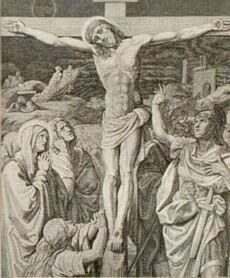
Jesus Dies Upon the Cross
V. We adore Thee, O Christ, and we praise Thee.
R. Because by Thy holy Cross Thou hast redeemed the world.
V. Adoramus te, Christe, et benedicimus tibi.
R. Quia per sanctam crucem tuam redemisti mundum.
Consider how thy Jesus, after three hours of agony on the Cross, consumed at length with anguish, abandons Himself to the weight of His Body, bows His Head, and dies.
Considera tuum cruci suffixum Iesum, qui post trium horarum cum morte luctam, doloribus tandem consumptus addicit corpus morti, et inclinato capite emittit spiritum.
O my dying Jesus, I kiss devoutly the Cross on which Thou did die for love of me. I have merited by my sins to die a miserable death, but Thy death is my hope, Ah, by the merits of Thy death, give me grace to die embracing Thy feet, and burning with love for Thee, I yield my soul into Thy hands.
I love Thee, my beloved Jesus, more than myself; I repent with all heart of ever having offended Thee. Never permit me to offend Thee again. Grant that I may love Thee always, and then do with me what Thou wilt.
O mortue Iesu, exosculor, pietatis sensu intime commotus, hanc crucem in qua tu, mei causa, vitae tuae finem implevisti. Ob commissa peccata infelicem mihi mortem promerui; sed mors tua est spes mea. Per mortis tuae merita, concede mihi precor, ut in amplexu pedum tuorum extremum spiritum, tui amore flagrans, aliquando reddam. In manus tuas commendo spiritum meum. Amo te ex toto corde meo; paenitet me quod tibi displicui: ne sinas me iterum tibi displicere. Da mihi perpetuum amorem tui, et dein fac de me quidquid tibi placuerit.
Pater, Ave, Doxologia Minor
Let me share with thee His pain,
Who for all my sins was slain,
Who for me in torments died.
Tui Nati vulnerati,
tam dignati pro me pati,
poenas mecum divide.
V. Lord Jesus, crucified,
R. Have mercy on us!
The Thirteenth Station
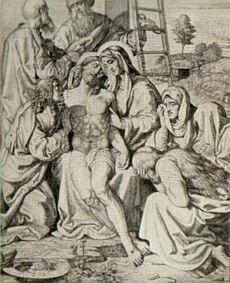
Jesus Is Taken Down From the Cross
V. We adore Thee, O Christ, and we praise Thee.
R. Because by Thy holy Cross Thou hast redeemed the world.
V. Adoramus te, Christe, et benedicimus tibi.
R. Quia per sanctam crucem tuam redemisti mundum.
Consider how, after the death of our Lord, two of His disciples, Joseph and Nicodemus, took Him down from the Cross, and placed Him in the arms of His afflicted Mother, who received Him with unutterable tenderness, and pressed Him to her bosom.
Considera quomodo duo ex Iesu discipulis, Iosephus nempe et Nicodemus, eum exanimatum de cruce tollant et inter brachia perdolentis Matris reponant, quae mortuum Filium peramanter recipit et arcte complectitur.
O Mother of Sorrows, for the love of this Son, accept me for thy servant, and pray to Him for me. And Thou, my Redeemer, since Thou hast died for me, permit me to love Thee; for I wish but Thee and nothing more.
I love Thee, my beloved Jesus, more than myself; I repent with all heart of ever having offended Thee. Never permit me to offend Thee again. Grant that I may love Thee always, and then do with me what Thou wilt.
O moerens Mater, per amorem quo Filium tuum amas, accipe me in servum tuum et precare eum pro me. Tu vero, o mi Redemptor, quoniam pro me mortuus es, fac benigne ut amem te; te enim solum volo, nec extra te aliud quidpiam mihi opto. Amo te, o mi Iesu, paenitet me quod tibi displicui: ne sinas me iterum tibi displicere. Da mihi perpetuum amorem tui, et dein fac de me quidquid tibi placuerit.
Pater, Ave, Doxologia Minor
Let me mingle tears with thee,
Mourning Him who mourned for me,
All the days that I may live:
Fac me tecum pie flere,
crucifixo condolere,
donec ego vixero.
V. Lord Jesus, crucified,
R. Have mercy on us!
The Fourteenth Station
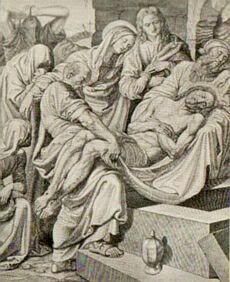
Jesus Is Laid In the Tomb
V. We adore Thee, O Christ, and we praise Thee.
R. Because by Thy holy Cross Thou hast redeemed the world.
V. Adoramus te, Christe, et benedicimus tibi.
R. Quia per sanctam crucem tuam redemisti mundum.
Consider how the disciples carried the body of Jesus to bury it, accompanied by His holy Mother who arranged it in the sepulcher with her own hands. They then closed the tomb, and all withdrew.
Considera quomodo discipuli exanimem Redemptorem ad locum sepulturae deferant. Moerens Mater eos comitatur, et propriis manibus corpus Filii sepulturae accommodat. Sepulchrum dein occluditur, et omnes a loco recedunt.
Oh, my buried Jesus, I kiss the stone that encloses Thee. But Thou didst rise again the third day. I beseech Thee by Thy resurrection, make me rise glorious with Thee at the last day, to be always united with Thee in Heaven, to praise Thee and love Thee forever.
I love Thee, my beloved Jesus, more than myself; I repent with all heart of ever having offended Thee. Never permit me to offend Thee again. Grant that I may love Thee always, and then do with me what Thou wilt.
O sepulte Iesu, exosculor hunc, qui te recondit, lapidem; sed post triduum ex sepulcro resurges. Per tuam resurrectionem fac me, precor, extremo die gloriosum tecum resurgere, et venire in caelum, ubi tecum semper coniunctus, te laudabo et in aeternum amabo. Amo te, et doleo quod tibi displicui: ne sinas me iterum tibi displicere. Da mihi perpetuum amorem tui, et dein fac de me quidquid tibi placuerit.
Pater, Ave, Doxologia Minor
By the Cross with thee to stay,
There with thee to weep and pray,
Is all I ask of the to give.
Iuxta Crucem tecum stare,
et me tibi sociare
in planctu desidero.
V. Lord Jesus, crucified,
R. Have mercy on us!
Concluding Prayers
After this, return to the high altar and, to complete this devotion, say the:
Our Father, Hail Mary and Glory Be five times (each) in honor of the Passion of Jesus Christ.
Prayer To Be Said Kneeling Before the Crucifix:
Behold, O kind and most sweet Jesus, I cast myself upon my knees in Thy sight, and with the most fervent desire of my soul, I pray and beseech Thee that Thou wouldst impress upon my heart lively sentiments of faith, hope and charity, with true contrition for my sins and a firm purpose of amendment; while with deep affection and grief of soul I ponder within myself and mentally contemplate Thy five wounds, having before my eyes the words which David the prophet put on Thy lips concerning Thee: "They have pierced My hands and My feet, they have numbered all My bones" (Ps xxi, 17-18).
At the end, one Our Father and Hail Mary, at least, should be said for the intentions of the Sovereign Pontiff; this will fullfill the requirements for a plenary indulgence connected to this devotion -- so long as a person also fulfills the other requirements(be in a state of grace, make sacramental confession and Communion the same day).
Remainder of the Stabat Mater
Virgin of all virgins blest!,
Listen to my fond request:
Let me share thy grief divine;
Let me, to my latest breath,
In my body bear the death
Of that dying Son of thine.
Wounded with His every wound,
Steep my soul till it hath swooned,
In His very Blood away;
Be to me, O Virgin, nigh,
Lest in flames I burn and die,
In His awful Judgment Day.
Christ, when Thou shalt call me hence,
Be Thy Mother my defense,
Be Thy Cross my victory;
While my body here decays,
May my soul Thy goodness praise,
Safe in paradise with Thee.
Amen.
Virgo virginum praeclara,
mihi iam non sis amara,
fac me tecum plangere.
Fac, ut portem Christi mortem,
passionis fac consortem,
et plagas recolere.
Fac me plagis vulnerari,
fac me Cruce inebriari,
et cruore Filii.
Flammis ne urar succensus,
per te, Virgo, sim defensus
in die iudicii.
Christe, cum sit hinc exire,
da per Matrem me venire
ad palmam victoriae.
Quando corpus morietur,
fac, ut animae donetur
paradisi gloria.
Amen.
Let us pray:
Let intercession be made for us, we beseech Thee, O Lord Jesus Christ, now and at the hour of our death, before the throne of Thy mercy, by the blessed Virgin Mary, Thy Mother, whose most holy soul was pierced by a sword of sorrow in the hour of Thy bitter Passion. Through Thee, Jesus Christ, Savior of the world, who with the Father and the Holy Ghost livest and reignest for ever and ever.
Amen.
Oremus:
Interveniat pro nobis, quaesumus, Domine Iesu Christe, nunc et in hora mortis nostrae, apud tuam clementiam beata Virgo Maria tua, cuius sacratissimam animam in hora tuae passionis doloris gladius pertransivit. Per te, Iesu Christe, Salvator mundi, qui cum Patre et Spiritu Sancto vivis et regnas in saecula saeculorum.
Amen.
The Devotion Concluded.

Good Friday, 1613, Riding Westward
by John Donne
by John Donne
Let mans Soule be a Spheare, and then, in this,
The intelligence that moves, devotion is,
And as the other Spheares, by being growne
Subject to forraigne motions, lose their owne,
And being, by others hurried every day,
Scarce in a yeare their naturall forme obey:
Pleasure or businesses so, our Soules admit
For their first mover, and are whirld by it.
Hence is't, that I am carryed towards the West
This day, when my Soules forme bends toward the East.
There I should see a Sunne, by rising set,
And by that setting endlesse day beget;
But that Christ on this Crosse, did rise and fall,
Sinne had eternally benighted all.
Yet dare I'almost be glad, I do not see
That spectacle of too much weight for mee.
Who sees Gods face, that is selfe life, must dye;
What a death were it then to see God dye?
It made his owne Lieutenant Nature shrinke,
It made his footstools crack, and the Sunne winke.
Could I behold those hands which span the Poles,
And tune all spheares at once, peirc'd with those holes?
Could I behold that endlesse height which is
Zenith to us, and our Antipodes,
Humbled below us? or that blood which is
The seat of all our Soules, if not of his,
Made durt of dust, or that flesh which was worne
By God, for his appare'l, rag'd, and torne?
If on these things I durst not looke, durst I
Upon his miserable mother cast mine eye,
Who was Gods partner here, and furnish'd thus
Halfe of that Sacrifice, which ransom'd us?
Though these things, as I ride, be from mine eye,
They'are present yet unto my memory,
For that looks towards them; and thou look'st towards mee,
O Saviour, as thou hang'st upon the tree;
I turne my backe to thee, but to receive
Corrections, till thy mercies bid thee leave.
O thinke mee worth thine anger, punish mee,
Burne off my rusts, and my deformity,
Restore thine Image, so much, by thy grace,
That thou may'st know mee, and I'll turne my face.
Thursday, March 28, 2013
Maundy Thursday 2013




We move back in time with Tissot to pivotal moments of the Last Supper
Station Church:
St. John Lateran
From The Passion And Death Of Jesus Christ, by Saint Alphonsus de Liguori:
O my dearest Jesus, in order to show me the great love Thou bearest me, Thou wouldst not commit the work of my redemption to any other than Thyself. Was my love, then, of such consequence to Thee, that Thou wouldst suffer so much in order to gain it? Oh, what more couldst Thou have done if Thou hadst had to gain to Thyself the love of Thy Divine Father? What more could a servant endure to acquire to himself the affections of his master than what Thou hast suffered in order that Thou mayest be loved by me, a vile, ungrateful slave?
Devotions For a Maundy Thursday holy hour:
(texts of all prayers available at Recta Ratio: The Yahoo Group)
O Salutaris
The Jesus Prayer
Adoro Te Devote
Pange Lingua (minus the Tantum Ergo)
O Sacrum Convivium
Anima Christi
Panis Angelicus
The Divine Praises
Holy, Holy, Holy (hymn)
Prayer Before Communion of St. Ambrose
" " of St. Thomas Aquinas
Spiritual Communion of St. Alphonsus Liguori
" " of St. Josemaria Escriva
Prayer After Communion of St. Pio
Ave Verum Corpus
Tantum Ergo
Holy God, We Praise Thy Name
From The Liturgical Year, by Abbot Prosper Gueranger, O.S.B.
The Church intends, on this day, to renew, in a most solemn manner, the mystery of the last Supper: for our Lord Himself, on this occasion of the institution of the blessed Sacrament, said to His apostles, Do this for a commemoration of Me.'1 Let us, therefore, resume the Gospel narrative.
Jesus is in the supper chamber, where the Paschal lamb is to be eaten. All the apostles are with Him; Judas is there, also, but his crime is not known to the rest. Jesus approaches the table, on which the lamb is served. His disciples stand around Him. The ceremonies prescribed by God to Moses are religiously observed. At the beginning of the repast, Jesus speaks these words to His apostles: 'With desire I have desired to eat this Pasch with you, before I suffer.'2 In saying this, He does not imply that the Pasch of this year is intrinsically better than those that have preceded it; but that it is dearer to Him, inasmuch as it is to give rise to the institution of the new Pasch, which He has prepared for mankind, and which He is now going to give them as His last gift; for, as St. John says, having loved His own, who were in the world, He loved them unto the end.3
During the repast, Jesus, who reads the hearts of all men, utters these words, which cause great consternation among the disciples: 'Amen I say to you that one of you is about to betray Me:—he that dippeth his hand with Me in the dish, he shall betray Me.'4 The sadness with which He speaks is enough to soften any heart; and Judas, who knows his Master's goodness, feels that they imply a merciful pardon, if he will but ask it. But no: the passion of avarice has enslaved his soul, and he, like the rest of the apostles, says to Jesus: 'Is it I, Rabbi?' Jesus answers him in a whisper, in order not to compromise him before his brethren: 'Thou hast said it!' But Judas yields not. He intends to remain with Jesus, until the hour comes for betraying Him. Thus, the august mystery, which is on the point of being celebrated, is to be insulted by his presence!
The legal repast is over. It is followed by a feast, which again brings the disciples around their divine Master. It was the custom in the east, that guests should repose two and two on couches round the table: these have been provided by the disciple who has placed his house at Jesus' service. John is on the same couch as Jesus, so that it is easy for him to lean his head on his Master's breast. Peter is on the next couch, on the other side of Jesus, who is thus between the two disciples whom He had sent, in the morning to prepare the Pasch, and who, as we have already observed, represent faith and love. The second repast is a sorrowful one, in consequence of Jesus having told the guests that one of them is a traitor. The innocent and affectionate John is overwhelmed with grief, and seeks consolation on the Heart of his dear Lord, whom some one is about to deliver to His enemies.
But the apostles little expect a third supper; Jesus has not told them of His intention; but He had made a promise, and He would fulfil it before His Passion. Speaking, one day, to the people, He had said: 'I am the living bread which came down from heaven: if any man eat of this bread, he shall live for ever, and the bread that I will give, is My Flesh for the life of the world... My Flesh is meat indeed, and My Blood is drink indeed. He that eateth My Flesh and drinketh 'My Blood, abideth in Me, and I in him.'5 The time has come for the fulfilment of this His loving promise. But as it was both His Flesh and His Blood that He promised us, He waited till the time of His sacrifice. His Passion has begun; He is sold to His enemies; His life is already in their hands:—He may at once, therefore, offer Himself in sacrifice, and give to His disciples the very Flesh and Blood of the Victim.
As soon as the second repast is over, Jesus suddenly rises, and, to the astonishment of His apostles, takes off His upper garment, girds Himself as a servant with a towel, pours water into a basin, and prepares to wash the feet of the guests. It was the custom in the east, to wash one's feet before taking part in a feast; it was considered as the very extreme of hospitality, when the master of the house himself did this service to his guest. Jesus is about to regale His apostles with a divine banquet; He wishes to treat them with every possible mark of welcome and attention. But in this, as in every other action of His, there is a fund of instruction: He would teach us, by what He is now doing, how great is the purity wherewith we should approach the holy Table. ' He that is washed,' says He, 'needeth not but to wash his feet;'6 as though He would say: ' The holiness of this Table is such, that those who come to it should not only be free from grievous sins, but they should, moreover, strive to cleanse their souls from those lesser faults, which come from contact with the world, and are like the dust that covers the feet of one that walks on the highway.' We will explain further on the other teachings conveyed by this action of our Lord.
It is with Peter, the future head of His Church, that Jesus begins. The apostle protests; he declares that he will never permit his Master to humble Himself so low as this: but he is obliged to yield. The other apostles (who, as Peter himself, are reclining upon their couches) receive the same mark of love: Jesus comes to each of them in turn, and washes their feet. Judas is not excepted: he has just received a second warning from his merciful Master; for Jesus, addressing Himself to all the apostles, said to them: 'You are clean, but not all':7 but the reproach produced no effect upon this hardened heart. Having finished washing the feet of the twelve, Jesus resumes His place, side by side with John.
Then taking a piece of the unleavened bread, that had remained over from the feast, He raises His eyes to heaven, blesses the bread, breaks it, and distributes it to His disciples saying to them: 'Take ye, and sat; this is My Body'.8 The Apostles take the bread, which is now changed into the Body of their divine Master; they eat: and Jesus is now not only with them, but in them. But, as this sacred mystery is not only the most holy of the Sacraments, but moreover a true Sacrifice; and as a Sacrifice requires the shedding of blood; our Jesus takes the cup, and changing the wine into His own Blood, He passes it round to His disciples, saying to them: 'Drink ye all, of this; for this is My Blood of the new testament, which shall be shed for many, unto remission of sins'.9 The apostles drink from the sacred chalice thus proffered them! When it comes to Judas, he too partakes of it, but he drinks his own damnation, as he ate his own judgment when he received the Bread of life.10 Jesus, however, mercifully offers the traitor another grace, by saying, as He gives the cup to His disciples: 'The hand of him that betrayeth Me is with Me on the table'.11
Peter is struck by Jesus thus frequently alluding to the crime, which is to be committed by one of the twelve. He is determined to find out who the traitor is. Not daring himself to ask Jesus, at whose right hand he is sitting, he makes a sign to John, who is on the other side, and begs him, to put the question. John leans on Jesus' breast, and says to Him in a whisper: 'Lord, who is it?' Jesus answers him in an equally suppressed tone: 'He to whom I shall reach bread dipped.' And having taken one of the pieces of bread that remained over from the repast, He dipped it, and gave it to Judas. It was one more grace offered and refused, for the evangelist adds: 'And after the morsel, satan entered into him.'12 Jesus again addresses him saying: 'That which thou dost, do quickly.'13 The wretch then leaves the room, and sets about the perpetration of his crime.
Such is the history of the Last Supper, of which we celebrate the anniversary on this day. But there is one circumstance of the deepest interest to us, to which we have, so far, made only an indirect allusion. The institution of the holy Eucharist, both as a Sacrament and a Sacrifice, is followed by another: the institution of a new priesthood. How could our Saviour have said: 'Except you eat the Flesh of the Son of man, and drink His Blood, you shall not have life in you,'14 unless He had resolved to establish a ministry upon earth, whereby He would renew, even to the end of time, the great mystery He thus commands us to receive? He begins it today, in the cenacle. The twelve apostles are the first to partake of it; but observe what He says to them: 'Do this for a commemoration of Me.'15 By these words, He gives them power to change bread into His Body, and wine into His Blood; and this sublime power shall be perpetuated in the Church, by holy Ordination, even to the end of the world. Jesus will continue to operate, by the ministry of mortal and sinful men, the mystery of the Last Supper. By thus enriching His Church with the one and perpetual Sacrifice, He also gives us the means of abiding in Him, for He gives us, as He promised, the Bread of heaven.
Today, then, we keep the anniversary, not only of the institution of the holy Eucharist, but also of the equally wonderful institution of the Christian priesthood.
To offer the faithful an outward expression of the greatness and the unity of this Supper, which our Saviour gave to His disciples, and, through them, to us, the Church forbids her priests to say private Masses on this day, except in cases of necessity. She would have but one Sacrifice to be offered in each church, at which the other priests are to assist, and receive holy Communion from the hands of the celebrant. When approaching the altar, they put on the stole, the emblem of their priesthood.
The Mass of Maundy Thursday is one of the most solemn of the year; and although the feast of Corpus Christi is the day for solemnly honouring the mystery of the holy Eucharist, still, the Church would have the anniversary of the last Supper to be celebrated with all possible splendour. The colour of the vestments is white, as it is for Christmas day and Easter Sunday; the decorations of the altar and sanctuary all bespeak joy, and yet, there are several ceremonies during this Mass; which show that the holy bride of Christ has not forgotten the Passion of her Jesus, and that this joy is but transient. The priest entones the angelic hymn, Glory be to God in the highest! and the bells ring forth a joyous peal, which continues during the whole of the heavenly canticle: but from that moment they remain silent, and their long silence produces, in every heart, a sentiment of holy mournfulness. But why does the Church deprive us, for so many hours of the grand melody of these sweet bells, whose voices cheer us during the rest of the year? It is to show us that this world lost all its melody and joy when its Saviour suffered and was crucified. Moreover, she would hereby remind us, how the apostles (who were the heralds of Christ, and are figured by the bells, whose ringing summons the faithful to the house of God), fled from their divine Master and left Him a prey to His enemies.
The holy Sacrifice continues as usual; but at the solemn moment of the elevation of the holy Host and the Chalice of salvation, the bell is silent, and outside the church there is not given to the neighbourhood the usual signal of the descent of Jesus upon the altar. When the time of the holy Communion is near, the priest does not give the kiss, of peace to the deacon, who, according to the apostolic tradition, should transmit it, by the subdeacon, to those who are about to communicate. Our thoughts turn to the traitor Judas, who on this very day profaned the sign of friendship by making it an instrument of death. It is out of detestation for this crime, that the Church omits, today, the sign of fraternal charity: it would too painfully remind us of the sacrilegious hypocrisy.
Another rite peculiar to today, is the consecration of two Hosts during the Mass. One of these the priest receives in Communion; the other he reserves, and reverently places it in a chalice, which he covers with a veil. The reason of this is that tomorrow the Church suspends the daily Sacrifice. Such is the impression produced by the anniversary of our Saviour's death, that the Church dares not to renew upon her altars the immolation which was then offered on Calvary; or rather, her renewal of it will be by fixing all her thoughts on the terrible scene of that Friday noon. The Host reserved from today's Mass, will be her morrow's participation. This rite is called the Mass of the Presanctified, because, in it, the priest does not consecrate, but only receives the Host consecrated on the previous day. Formerly, as we shall explain more fully further on, the holy Sacrifice was not offered up on Holy Saturday, and yet the Mass of the Presanctified was not celebrated as it was on the Friday.
But although the Church suspends, for a few short hours, the oblation of the perpetual Sacrifice, she would not that her divine Spouse should lose aught of the homage that is due to Him in the Sacrament of His love. Catholic piety has found a means of changing these trying hours into a tribute of devotion to the holy Eucharist. In every church is prepared a richly ornamented side-chapel or pavilion, where, after today's Mass, the Church places the Body of her divine Lord. Though veiled from their view, the faithful will visit Him in this His holy resting-place, pay Him their most humble adorations, and present Him their most fervent supplications. Wheresoever the Body shall be, there shall the eagles be gathered together.16 In every part of the Catholic world, a concert of prayer, more loving and earnest than at any other period of the year, will be offered to our Jesus, in reparation for the outrages He underwent, during these very hours, from the Jews. Around this anticipated tomb will be united both His long-tried and fervent servants, and those who are newly converted, or are preparing for their reconciliation.
At Rome, the station is in the Lateran basilica. The metropolitan church both of the holy city and of the world was deservedly chosen for this great day of the reconciliation of sinners and of the consecration of the chrism. The papal function, however, now takes place at the Vatican; and, as we have already stated, the apostolic benediction is given by the sovereign Pontiff from the loggia of St. Peter's.
Pange Lingua
Pange lingua gloriosi
Corporis mysterium,
Sanguinisque pretiosi,
Quem in mundi pretium
Fructus ventris generosi,
Rex effudit gentium.
Nobis datus, nobis natus
Ex intacta Virgine
Et in mundo conversatus,
Sparso verbi semine,
Sui moras incolatus
Miro clausit ordine.
In supremae nocte cenae
Recum bens cum fratribus,
Observata lege plene
Cibis in legalibus,
Cibum turbae duodenae
Se dat suis manibus
Verbum caro, panem verum
Verbo carnem efficit:
Fitque sanguis Christi merum,
Et si sensus deficit,
Ad firmandum cor sincerum
Sola fides sufficit.
Tantum ergo Sacramentum
Veneremur cernui:
Et antiquum documentum
Novo cedat ritui:
Praestet fides supplementum
Sensuum defectui.
Genitori, Genitoque
Laus et iubilatio,
Salus, honor, virtus quoque
Sit et benedictio:
Procedenti ab utroque
Compar sit laudatio.
Amen.
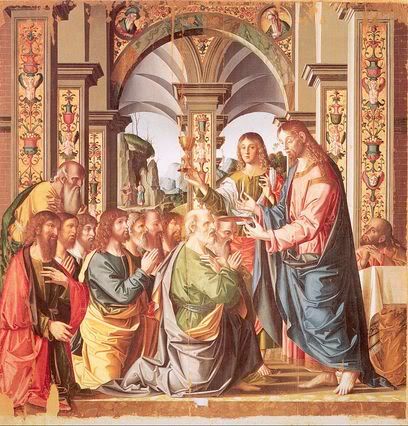
Marco Palmezzano
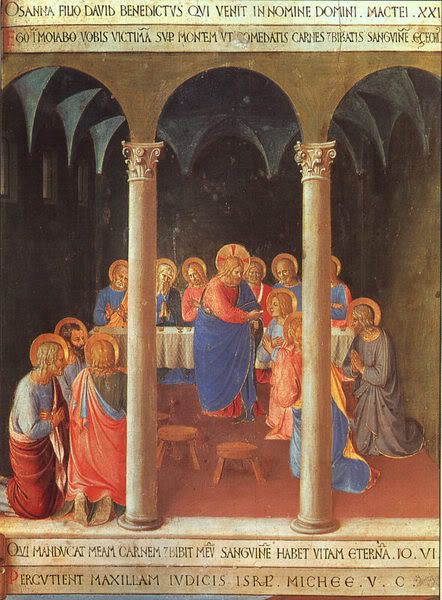
Bl. Fra Angelico

Giotto
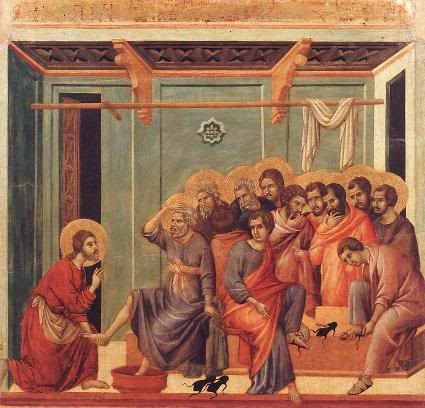
Duccio di Buoninsegna c. 1308
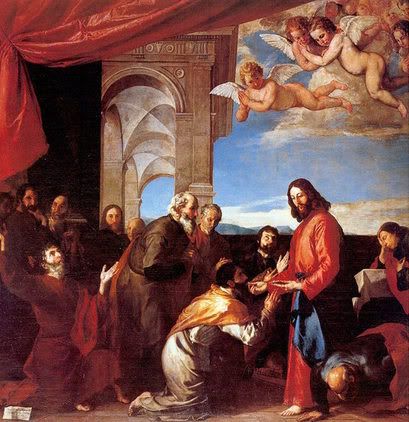
Jusepe de Ribera

Signorelli
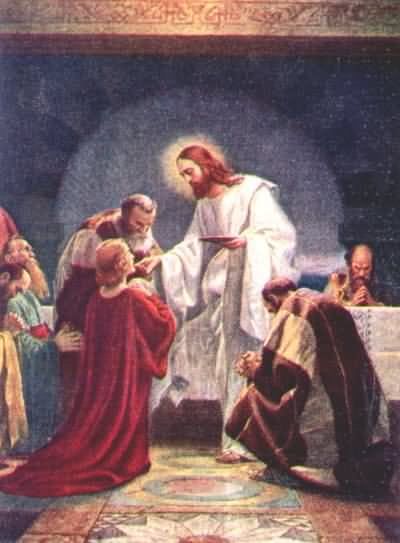
From the St. Joseph's Daily Missal, 1959
Holy Thursday is known in the British Isles as Maundy Thursday. The name may come from one of two sources. The British monarch distributes maunds, or baskets of charity to the poor on Holy Thursday. But some believe the name comes from the Latin "mandatum," from the last commands the Lord gave the Apostles at the Last Supper.
The giving of maunds by the monarch is part of a ceremony at a cathedral. He provides coins to one elderly man and one elderly woman for each year of his reign. The monarch also used to copy the priestly function of washing the feet of the same people. The washing of the feet is, of course, the symbolic embodiment of the function of priesthood. Maundy Thursday is the anniversary of not just the institution of the Holy Eucharist, but also of the priesthood. The two are, of course linked. Without a priesthood legitimately tracing its lineage to Peter and the other Apostles, there is no Eucharist.
However, in pre-Reformation England, the day was also known as "Sheer Thursday," "Sharp Thursday," "Char Thursday," or "Shrift Thursday" because, as part of a process of personal renewal, men typically cut their beards or hair on this day to look their best on Easter Sunday. In the Church, those notorious sinners who had been excluded from church during Lent were now re-admitted on confession.
Bishops blessed oil for use in providing Extreme Unction to the dying, and to anoint the newly ordained for the coming year. Altars were cleaned (after all, they would be stripped after the Mass of the Lord's Supper). After the final Mass for the day, the Holy Eucharist would be carried in solemn procession to a tabernacle of repose, much as we do today. In pre-Reformation England, the custom was to fashion something that would resemble the Lord's tomb, and to place the Eucharist there until the Vigil Mass on Holy Saturday. These are called "Easter Sepulchres," and I have discussed this on previous occasions.
Wednesday, March 27, 2013
Spy Wednesday 2013
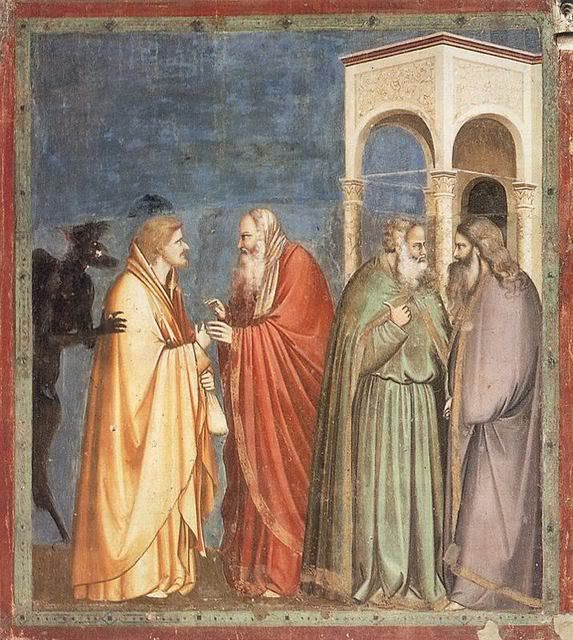
The Pact of Judas, by Giotto
Station Church:
St. Mary Major





From The Passion And Death Of Jesus Christ, by Saint Alphonsus de Liguori:
And what kind of affronts did not the Redeemer suffer in His Passion? He saw Himself affronted by His own disciples. One of them betrays Him and sells Him for thirty pieces. Another denies Him many times, protesting publicly that he knows Him not; and thus attesting that he was ashamed to have known Him in the past. The other disciples, when they see Him taken and bound, all fly and abandon Him: Then his disciples leaving him, all fled away. (Mark xiv. 50).
O my Jesus, thus abandoned, who will ever undertake Thy defence, if, when Thou art first taken, those most dear to Thee depart from and forsake Thee? But, my God, to think that this dishonour did not end with Thy Passion! How many souls, after having offered themselves to follow Thee, and after having been favoured by Thee with many graces and special signs of love, being then driven by some passion of vile interest, or human respect, or sordid pleasure, have ungratefully forsaken Thee! Which of these ungrateful ones is found to turn and lament, saying, Ah, my dear Jesus, pardon me; for I will not leave Thee again. I will rather lose my life a thousand times than lose Thy grace, O my God, my Love, my All.
Devotions for a Lenten Wednesday holy hour:
Dies Irae
Divine Mercy Chaplet
Seven Penitential Psalms & the prayers against the Seven Deadly Sins
Prayer of St. Thomas More
Threnus Prayer
Seven Prayers of St. Gregory
"Still, as of old, man by himself is priced;
For thirty pieces Judas sold himself, not Christ"
Traditionally today is observed as the day Judas went to the high priest to offer to betray the Lord. Of course, he could have done so at any time, perhaps early on Maundy Thursday. I'm sure that the other Apostles did not get an opportunity to question him on Good Friday morning, or the high priest, for that matter, to get all the details. But traditionally, his betrayal is recognized on this day.
The only custom specific to Spy Wednesday that I am aware of comes from Poland. There, the young people throw an effigy of Judas from the top of a church steeple. Then it is dragged through the village while sticks and stones are hurled at it. What remains of the effigy is then thrown into a nearby stream or pond, symbolically drowning it.
The Tenebrae is chanted for the first time tonight. Tonight's Tenebrae consists of the combined office of Matins and Lauds for Maundy Thursday. Tomorrow's Tenebrae is Matins and Lauds for Good Friday. Good Friday's Tenebrae is the combined Matins and Lauds for Holy Saturday.
Matins was traditionally chanted at midnight, but has slipped into the just-pre-dawn hours for the convenience of the monks and nuns. Lauds used to be just after dawn. But there is a tradition going back before the protestant rebellion of chanting these offices in the relatively-early evening of the day before for the Triduum, so that locals could attend.
This has always been a good day for confession and house cleaning in preparation for Easter.






































































































